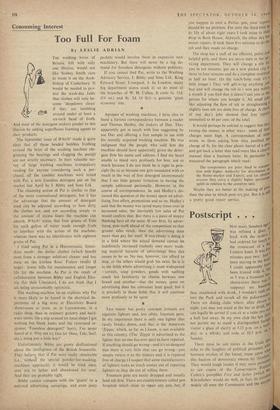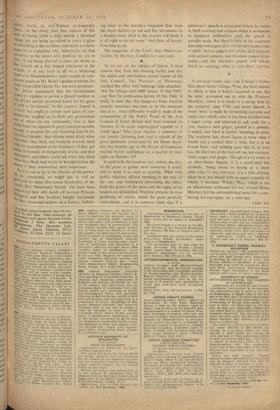Postscript . • •
NOT many Sundays ag was refused a glass ° I hock with the oysters, had ordered for lunch in the restaurant of a big London hotel. It was 111 minutes past two : had , been staying in the hotel I could apparently have been trusted with it. I'll as I was a transient 1101(i cheon-eater there was suppose) no knoWin't that, maddened with drink, I wouldn't rush n" into the Park and ravish all the policeworoent. There are dining clubs where, after eleven st night, you may not stand at the bar to drink. bLij can legally be served if you sit at a table two 3", a half feet away. In my own club the law (11,1c'o not permit me to stand a distinguished forelgv, visitor a glass of sherry at 5.25 p.m. on a Wee day, or a whisky and soda at 10.5 p.m. on Sunday. There must be salt mines in the Urals tbact, echo to the laughter of political prisoners wo between strokes of the knout, muse upon Wtillroi this bastion of democracy means by free ej They would laugh louder if they were perflit.c.11 to see copies of the Conservative Pbotlror. Centre's pamphlet Free and Sober (which we Khrushchev would do well, in fact, to circa-01, widely all over the Communist and the IOC° rnitted world, as anti-Western propaganda). There, on the cover, four free citizens of this land of liberty (with a dog) outside a thatched Village inn are being permitted to enjoy a glass of something in the sunshine, and inside are thirty Pages or so explaining why, historically, we find ourselves in the damn silly position we arc in now, of not being allowed to slake our thirsts at five o'clock on a hot August afternoon at the seaside, or at any hour at all on a blistering Sunday in Monmouthshire, and a couple of com- placent pages on Mr. Butler's golden promises for s°roe unspecified future. No, not even promises: Butler announced that the Government il.°Oed to legislate to permit a [hotel] resident to tIS' drinks outside permitted hours for his guest `k well as for himself.' In this context, 'hoped' is Word that ought to arouse such gales of con- temptuous laughter as to blow any government out of office—in any community, that is, that could boast an opposition party common-sensible ell°4811 to propose the only licensing laws fit for 4:eivilised people: that citizens could drink when 3:d where they liked, and would be severely dealt elth (by punishment or by treatment) if they got .11her tiresomely or dangerously drunk. and that i 1111keepers and others could sell what they liked ,. .11en they liked, and would be brought before the "iris if they overworked their employees. 0 As it is, and as far as the liberties of the grown- ! are concerned, we might just as well be rverned by those blue-nosed busybodies of the squawking Day Observance Society who have been :illiawking their silly heads off because Princess for and her husband bought ice-creams 1° their niece and nephew on a Sunday, bellow-
ing away in the Society's magazine that 'once the royal children go out and buy ice-creams on a Sunday every child in the country will think it is all right to do the same.' And then, of course, God help us all.
The magazine of the Lord's Day Observance Society. by the way. is called Joy and Light.
As WC are on the subject of liberty, I mutt observe that both this footling leaflet and also the useful and informative annual report of the Arts Council, The Priorities of Patronage, reached this office with 'embargo' slips attached: 'Not for release until 0001 hours, 11 Oct 1960,' ;..nd 'Not for publication before 13 Oct 1960." It really is time that this hangover from wartime security measures was seen to be the nonsense that it is: what difference would it make if the composition of the Poetry Panel of the Arts Council of Great Britain had been revealed on October 12 by some unprincipled reporter to a woild agog? Who cares whether a summary of our lunatic licensing laws and a rehash of the pious platitudes enunciated by the Home Secre- tary ten months ago in the House of Commons reaches Soviet intelligence at a quarter to mid- night on October 10?
It used to be the function and. indeed, the duty of the' press to gather news wherever it could, and to print it as soon as possible. What with public relations officers standing in the way of the one, and embargoes preventing the other, both the power of the press and the rights of its readers are diminished. Wartime presents its own problems, of course, which the press perfectly understands, and it is common sense that if a politician's speech is circulated before he makes it, both courtesy and caution oblige a newspaper to postpone publication until the speech is actually made. But there is little in the argument that time-embargoes give serious newspapers time to think. Serious papers will always deal seriously with serious subjects, and frivolous papers frivo- lously--and the frivolous papers will always break an embargo when it suits them, anyway.
A constant reader asks why 1 haven't written here about Stone's Ginger Wine, the short answer to which is that it hadn't occurred to me. But his letter prompted me to visit the Finsbury Distillery, where it is made to a recipe held by the company since 1740, and never altered. A sweet Swine' is made by fermenting currants and water, into which, after it has been fortified with a sugar syrup, and matured in oak casks for a year, Jamaica stem ginger, ground to a powder, is added, and there is further maturing in casks. The resultant hot, sweet liquor is more what I would call a cordial than a wine, but it is an honest brew, and nothing goes into it, or ever has, the directors of the firm tell me, but currants. water, sugar and ginger. Though it is as sweet as an after-dinner liqueur, it is a good deal less alcoholic, being about as strong as a sweet table wine. To my own taste, it is a little cloying, taken neat, but mixed with an equal quantity of whisky it becomes 'Whisky Mac,' which is not an affectionate nickname for our revered Prime Minister, but the old-established name for a com- forting warmer-upper on a cold day.
CYRIL RAY







































 Previous page
Previous page